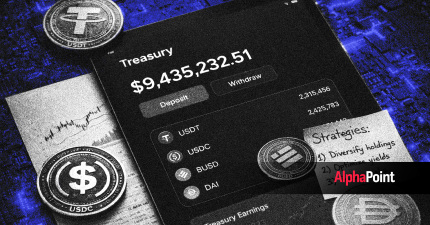Bitcoin ETFs: How They Work + 7 ETFs To Consider
Bitcoin (BTC), the first cryptocurrency, has revolutionized the financial market since its inception. It offers a decentralized way to transfer value — independent from traditional banking systems.
Interest in DeFi continues to grow, and thanks to the 2024 Bitcoin halving event, which cut Bitcoin’s mining rewards in half, investments in this digital asset are surging.
If you’re considering investing in the cryptocurrency market but don’t have much direct exposure to the coins themselves, Bitcoin exchange-traded funds (ETFs) are a great place to start.
ETFs combine the diversified portfolio of a mutual fund with the ease of trading a stock. They can grant you investment exposure to Bitcoin’s price movements without the hassle of managing actual cryptocurrencies.
With crypto ETFs, you can take advantage of the regulated familiarity of conventional stock markets and still benefit from the cryptocurrency sector’s potential gains.
What Are Bitcoin ETFs?
A Bitcoin ETF is a type of investment fund traded on stock exchanges. Its main purpose is to provide investors with exposure to Bitcoin without requiring them to directly purchase, store, or manage the cryptocurrency itself.
In short, they make the Bitcoin market more accessible to investors who prefer traditional investment vehicles.
Spot Bitcoin ETF vs. Futures Bitcoin ETF
Bitcoin Spot ETFs allow you to invest directly in the actual cryptocurrency, meaning the ETF holds the underlying Bitcoin. Your investment reflects the real-time price of Bitcoin.
Bitcoin Futures ETFs, on the other hand, involve contracts that bet on the future price of Bitcoin without directly owning it. These ETFs are based on Bitcoin futures contracts traded on exchanges and are regulated by the SEC (U.S. Securities and Exchange Commission).
How Do Bitcoin ETFs Impact the Cryptocurrency Market
Bitcoin ETFs impact the cryptocurrency market by offering traditional investors access to the world of crypto.
Simplifying Bitcoin investment through ETFs increases market liquidity and can reduce volatility. However, it’s crucial to remember that these funds still carry the inherent risks of cryptocurrency investments.
For the lay investor, ETFs can be less intimidating than dealing with cryptocurrency exchanges directly. This accessibility can widen the Bitcoin investor base — further integrating Bitcoin into the broader financial landscape.
Benefits of Spot Bitcoin ETFs
Spot Bitcoin ETFs offer a straightforward way to invest in the digital currency market without the complexities associated with direct cryptocurrency transactions.
Here, we’ll outline a few benefits of these funds.
Ease of Use
With a spot Bitcoin ETF, you sidestep the complex process of setting up a digital wallet, signing up with a cryptocurrency exchange, and figuring out how it works. Instead, you simply buy and sell shares through a traditional brokerage account.
This can be both a familiar and convenient approach, especially if you’re new to Bitcoin. So a broader range of investors can gain exposure to Bitcoin, expanding access to this asset class. Also, it lowers the learning curve associated with understanding and managing cryptocurrencies.
Liquidity
Investors trade spot Bitcoin ETFs on major stock exchanges, which means you have the benefit of high liquidity.
This allows you to execute trades swiftly, often with narrower bid-ask spreads than direct Bitcoin transactions, ensuring you can enter and exit positions with ease.
High liquidity also means that market movements are reflected more accurately, providing you with fairer pricing. And your ability to trade during regular market hours offers flexibility and convenience that direct cryptocurrency exchanges might not provide.
Security
A major concern with holding Bitcoin is security. Spot Bitcoin ETFs are secured in digital vaults managed by registered custodians, reducing the risk of loss due to hacking or misplaced private keys. Your investments are also protected under existing regulations that govern traditional ETFs.
These custodians employ advanced security measures, including multi-signature wallets and cold storage, to ensure the highest level of protection.
Lower Operational Risks
By investing in a spot Bitcoin ETF, you dramatically reduce your operational risks related to Bitcoin ownership.
You bypass the technicalities of managing cryptographic keys and the due diligence needed to choose a reliable crypto exchange. Plus, your holdings are shielded from the risks associated with individual storage devices failing.
This streamlined approach removes the burden of personal responsibility for security, leaving it in the hands of professional custodians. So you can focus more on your investment strategy rather than the operational details.
How Do Spot Bitcoin ETFs Work?
Spot Bitcoin ETFs allow you to invest in Bitcoin similarly to stocks, without directly handling digital currency. Each share you buy is backed by actual Bitcoin.
1. Asset Backing
Spot Bitcoin ETFs are unique in that they’re backed by the digital asset. For each share you buy, there’s a proportional amount of Bitcoin stored. This means when you purchase a share, you’re effectively buying actual Bitcoin, even if you don’t own it directly.
This setup provides investors with the benefits of owning Bitcoin, such as potential price appreciation, without the complexities of storing and securing the cryptocurrency themselves.
The asset backing also offers transparency and trust, as the amount of Bitcoin held is publicly verifiable.
2. Trading and Pricing
Spot Bitcoin ETF trading takes place on traditional stock exchanges, and their spot prices fluctuate throughout the trading day.
The value of an ETF share is directly tied to the changing price of Bitcoin, reflecting the current market value of the underlying asset. This real-time pricing allows investors to capitalize on market movements within regular trading hours, providing a familiar and straightforward method to gain exposure to Bitcoin.
The convenience of trading through established platforms means you can easily integrate Bitcoin into your broader investment portfolio.
3. Custody and Security
Securing the Bitcoin that backs an ETF is paramount. Spot Bitcoin ETFs employ custodians who manage cold storage wallets to protect the Bitcoin from online threats.
These secure digital vaults are critical to safeguarding assets against hacking or fraud. Cold storage involves keeping Bitcoin offline, making it inaccessible to cyber-attacks.
These custodians are often regulated entities with stringent security measures, ensuring the Bitcoin remains safe. This level of security provides peace of mind to investors, knowing their assets are well-protected.
4. Regulatory Compliance
Spot Bitcoin ETFs must comply with strict regulations set by financial authorities. By gaining approval from regulatory bodies, these ETFs ensure legitimacy and offer a safer route for investors who are cautious about navigating the cryptocurrency landscape.
Compliance with these regulations means the ETFs adhere to high standards of transparency, reporting, and investor protection. Regulatory oversight helps mitigate risks associated with cryptocurrency investments and promotes trust among institutional and retail investors alike.
5. Investment and Redemption
Investing in a spot Bitcoin ETF is straightforward: You can purchase shares through any broker that has access to the stock exchange where the ETF is listed.
Redemption, should you choose to sell, also happens through the exchange, offering a liquid and easily accessible method to divest from Bitcoin if needed. This ease of transaction removes the barriers associated with buying and selling cryptocurrency, such as setting up a digital wallet or dealing with exchanges.
7 Notable Bitcoin ETFs
As we’ve already mentioned, Bitcoin ETFs are a popular way for you to gain exposure to Bitcoin without handling the cryptocurrency itself.
Here’s a list of seven notable Bitcoin ETFs, showcasing their expense ratios, investment strategies, and year-to-date (YTD) performances.
Just remember that past performance is not an indicator of future success.
Grayscale Bitcoin Trust (GBTC)
- Expense Ratio: 1.50%
- YTD Performance: 40.06%
iShares Bitcoin Trust (IBIT)
- Expense Ratio: 0.12%
- YTD Performance: 0.00%
Bitwise Bitcoin ETF
- Expense Ratio: 0.20%
- YTD Performance: 0.00%
Ark 21Shares Bitcoin ETF (ARKB)
- Expense Ratio: 0.21%
- YTD Performance: 0.00%
ProShares Bitcoin Strategy ETF (BITO)
- Expense Ratio: 0.95%
- YTD Performance: 35.30%
VanEck Bitcoin Trust (HODL)
- Expense Ratio: 0.2%
- YTD Performance: 0.00%
WisdomTree Bitcoin Fund (BTCW)
- Expense Ratio: 0.30%
- YTD Performance: 0.00%
When choosing a Bitcoin ETF, you need to consider the expense ratio, which eats into potential returns, and the strategy, which indicates how closely it follows Bitcoin’s price movements.
As with any investment, you should review each ETF’s performance regularly and make educated decisions based on your financial goals and risk tolerance.
How AlphaPoint Is Providing the Digital Asset Infrastructure for Crypto Exchanges
Bitcoin ETFs are a convenient means for institutional investors to gain exposure to the price of bitcoin while avoiding the complexity of buying, storing, and managing the coins themselves.
And if you’re an institution looking for more ways to take advantage of the current crypto market at a retail level, AlphaPoint offers white label exchange technology that’s configurable to fit your existing financial platform.
Our infrastructure can help you launch an over-the-counter (OTC) trading platform and run your own digital asset exchange hassle-free. We make sure your users can trade Bitcoin and other cryptocurrencies like Ethereum quickly and easily.
Ready to see how easy launching a crypto exchange can be? Request an AlphaPoint demo today.


